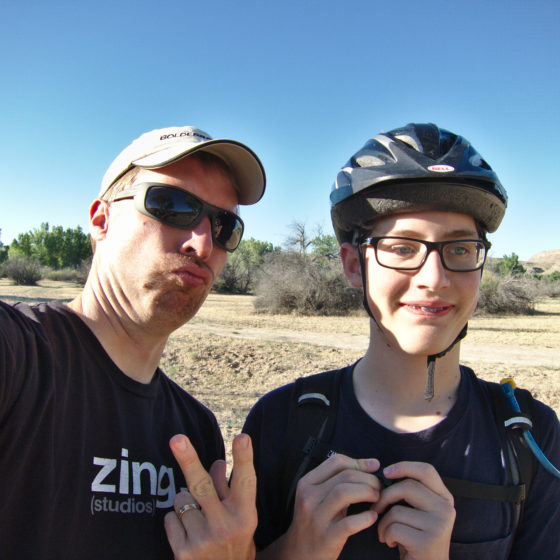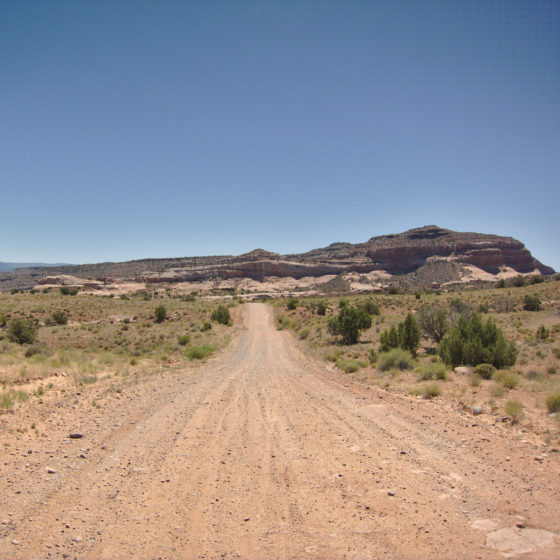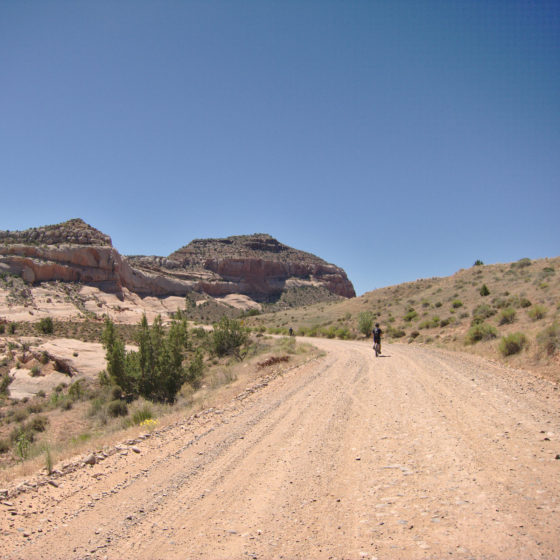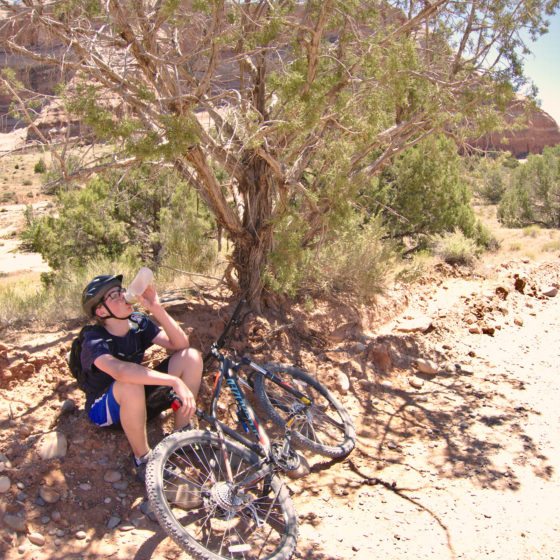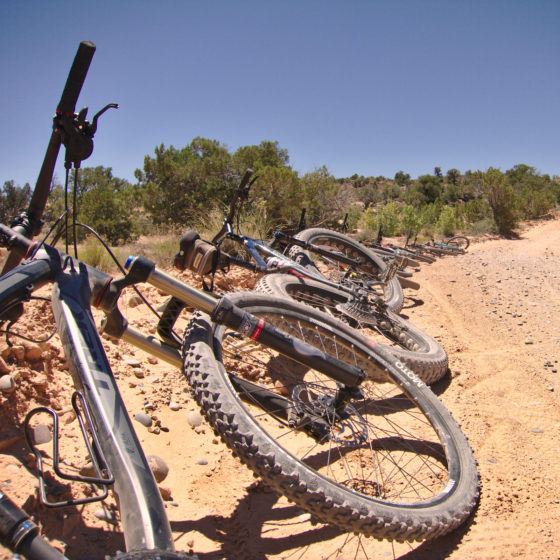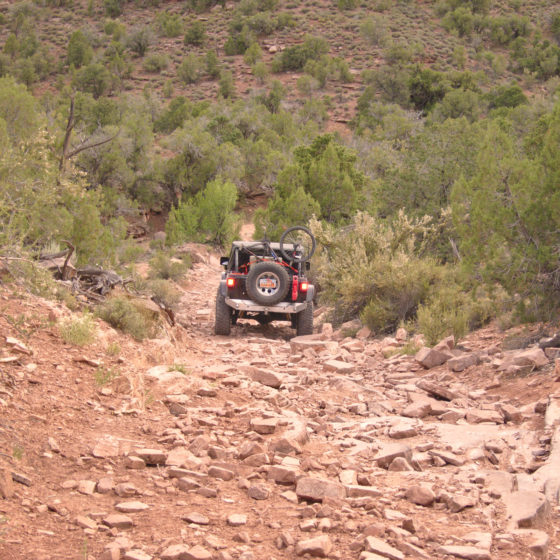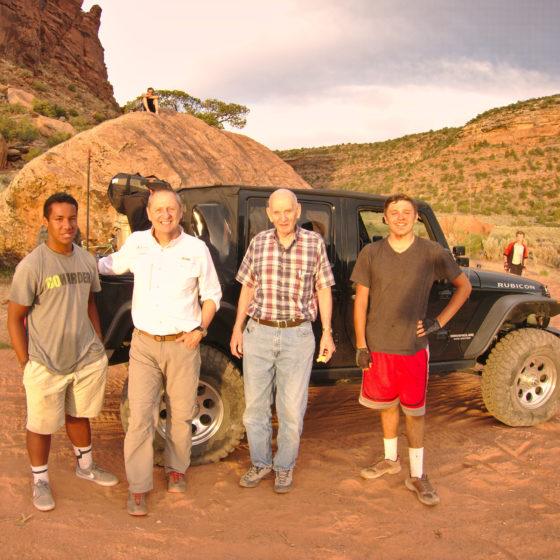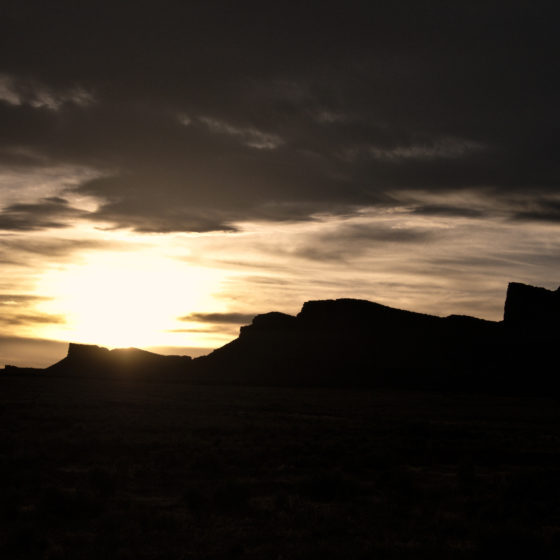This year, for their annual High Adventure trip, Zaque’s Boy Scout troop decided to bike the Kokopelli Trail, which is a famous mountain bike path from near Fruita, CO down to Moab, UT. It’s about 150 miles in all, and it covers a lot of rough desert terrain. Our fearless leader Mike had done it a couple of times with other troops, and was confident in the boys’ ability to make it. There were fourteen boys in all, ranging from 14 to 17 years old, and seven adult leaders, including me. We took a few practice rides around Longmont and on nearby trails in the months leading up to the expedition, and then headed out last week for the big trip.
Unfortunately, Zaque had to attend two training sessions for his new job at Chick-fil-A, and the sessions were during the first days of the trip. I offered to bring him and another friend (also training at the restaurant) late, and we’d meet the rest of the group partway along the trail. Everything sounded good.
On Wednesday evening, I picked up Zaque and his friend around 6pm and we started the long drive to the campground where the group was spending that night. It was a little over five hours of driving, and we ended up in a ghost town called Cisco, UT. It’s truly a ghost town, too: the handful of buildings are all falling apart, and it’s clear no one has lived there for decades. We arrived there around 11pm and started searching for the campground. It was very dark– no moon, and no artificial lights for miles. The directions I had were a little vague, and we quickly realized that there wasn’t any signage that would take us to the camp. Since we were so far from anything, cell phones didn’t work; even if they did, the rest of the group had gone to bed hours before in anticipation of their 5am wake-up.
We ended up on some dusty, rocky roads out in the wilderness, and my Civic struggled along as we grew increasingly desperate to find everyone. Because it was so dark, we could see only what was directly in front of the car. We navigated a terrible slope with a sheer drop on one side and a cliff rising on the other, and after another mile or two it was clear the “trail” we were following was not only wrong, but leading to nowhere. We turned around but then couldn’t get back up the slope: my car kept slipping in the dust, and it was grinding on the rocks beneath. After several aborted attempts, and a growing worry that we’d end up stranded in the wild miles from anyone (and completely out of contact), I gunned it and made my way up the hill, damaging my undercarriage and breaking a few things along the side of the car. Ugh.
Without any idea of where to go, and the clock passing midnight, we decided to just get some sleep and start fresh in the morning light. Zaque and I tossed our sleeping bags on the ground while his friend slept in the car (his sleeping bag had been packed and taken with the group). Luckily it was a warn evening: probably 70 degrees. The stars overhead were stunning because it was so dark. I admired them for a while and then fell into a fitful sleep.
Thursday morning we got moving at 5am and quickly packed up and went looking for the group. We found a turn we’d missed the night before, and after another ten minutes of driving we saw their camp. I’m not sure if we’d have found it in the dark. Of course they were happy to see us, and said they’d been pretty worried when we hadn’t come in as planned. We grabbed some breakfast with the rest of the group and prepared to start riding for the day.
The plan was to have thirteen boys, accompanied by four leaders, tackle the 36-mile route on bikes. Another adult would be riding an ATV along the trail to provide medical support and water. The remaining two adults would be driving the support trucks to the campsite so we’d be able to coast in at the end of the ride and prepare dinner. One of the boys had lost a contact lens and decided not to ride, and he’d help the adults at the trucks.
The previous two days had been fairly easy, with a lot of downhill runs, but Mike warned us that Thursday would involve a lot of climbing because we were approaching the mountains. Boy, he wasn’t kidding. The trail started out innocently enough, with some scattered rocks and a gentle incline.
After a while, it became steeper and more grueling, because the upward slope simply didn’t end. We climbed, and climbed, and then climbed some more. Every time I thought we’d hit the crest and have a chance for some downhill coasting, we’d turn the corner to find another hill ahead.
The hours ticked past, and as the sun climbed into the sky, the temperature continued to rise. We’d started the morning around 80 degrees, but by early afternoon it was 100. There was little shade, and of course the orange desert rock seems to just soak in the heat and re-radiate it. It was brutally hot. Along the trail were a few scraggly trees every half-mile or so, providing some paltry shade for us to stop and get a drink.
One of the boys had dropped out early in the ride, perhaps a mile from the start, and our ATV support rider had taken him back to the support trucks. We’d expected him to then turn around and follow us again, so we’d have extra water, but he didn’t. No one knew why. We pushed on.
By mid-afternoon, many of the boys had run out of water. All of us were drenched in sweat, and although we’d each carried 2-3 liters apiece in backpacks and additional water bottles on our bikes, it was clear we were suffering. The heat was stifling, there wasn’t much shade, and the desert air felt like an oven. I was riding in the back, supporting a couple of boys who were exhausted and moving pretty slowly. The main group would find a shady spot and stop for a little while, and when the trailing group caught up they’d be ready to ride again, so our rest breaks were frustrating because two-thirds of the boys were anxious to leave while the remaining ones wanted to get some rest. Since it’s important to stay together, we adults continued to stress that we’d need to move as a pack as best we could.
One boy suffered a bloody nose, which is a sign of dehydration. Others were borrowing water from friends. We were sharing as best we could, but we still had something like 20 miles to go to camp. It was far too late to turn around; the best option was to press forward. We used radios to call for help from the support trucks, but no one was answering (the range was only a few miles, and they were far beyond it). Finally, around 2pm as the heat of the day was really kicking in, we four adults agreed to send Greg, the best adult rider by far, ahead so he could find the ATV and coordinate a rescue of sorts. We really needed water to be brought up the trail. We pooled some water from a few people, and Greg headed up the trail with a quart in his pack.
Assuming he found the support team, we knew the ATV would be coming up the trail ahead of us with the much-needed water, so the smart thing to do was to continue moving forward. We covered several more miles, and at that point everyone was out of water. It was around 4pm, but the sun was still baking the landscape. More people were showing signs of dehydration. My mouth was so dry that my tongue had no saliva on it, and I was having difficulty speaking. I’d only been dehydrated once in my life, and I knew it was happening again. Things were getting serious.
After talking together, it seemed prudent to send the “fast” group ahead. About two-thirds of the boys were strong riders and could make good speed, so Chad went with them as a leader. Mike and I stayed behind with the slower group to help them along. When the fast group met up with Greg and the ATV on the trail, they could explain the circumstances and the ATV could bring water to the lagging group.
At last we crested the majority of the uphill section, at around the 20-mile point. Although it was now flat and trending downhill, the trail became much more rough: large rocks littered the path, and riding down required caution and skill to navigate the obstacles. A few of the rear group surged ahead. At that point, Zaque’s rear wheel fell off. Upon inspection, the quick-release axle had slipped out somehow, and now he had a bike that was unuseable… with 16 miles ahead of us. Mike and I were back with him, not sure how to proceed. It wasn’t possible to carry the bike the rest of the way, and even if we abandoned it (which we were loathe to do, since it was probably $1,500 or more), walking that distance so late in the day was out of the question. Coupled with the lack of water, this was a dire situation.
It was then that the first miracle happened. A black Jeep came up the trail behind us! There were two guys in it, and we flagged them down and explained what had happened. Tim, age 60, and Rich, age 82, were spending the day driving the trail. We asked if there was any way they could lash Zaque’s broken bike to the Jeep and give him a ride down the trail. They agreed, because they were going that way anyway. This portion of the Kokopelli Trail is more or less a long stretch without any side trails, so they would end up at our campsite. Perfect. Even more importantly, they had water! They had a few five-gallon tanks in the back, and the three of us refilled our packs and bottles. It was heavenly. They moved some gear in the Jeep to make room for Zaque, and he climbed in. Mike and I hopped back on our bikes and went forward (we could make faster progress than the Jeep, because they had to proceed slowly on the rocky terrain while we could dodge between the rocks as we coasted downhill).
After a while, it occurred to me that I’d just left my son with a couple of complete strangers in the middle of nowhere! While it’s true they had to go the same way we were going, I probably wouldn’t win any Father of the Year awards for a move like that. I told Mike to go ahead; I’d wait for the Jeep to catch up and then keep pace with them until we reached camp. He went onward, and after a few minutes the Jeep came into view. We covered a few miles, and then Zaque asked if he could ride my bike. The Jeep was a pretty rough ride as it bounced over boulders and climbed the inclines, and he was packed into the back amongst a bunch of gear– not very comfortable at all. I agreed, and he climbed on and moved ahead. I told Tim I’d just walk for a bit.
I came to the top of a stretch of the trail called the Rose Garden. It’s frighteningly rough terrain: impossible to ride down on a bike, but a world-famous challenge for “rock hoppers” like these two guys in the Jeep. In fact, they’d come along this trail partly to take on the Rose Garden. Looking down the steep slope, covered with boulders, I could hardly believe any vehicle could make it. But they were determined to try.
It was there I met another of the boys, whose derailleur had broken a little while ago. He was pushing the bike because it was more or less unrideable. Looking at him, I could tell he was absolutely exhausted and at the end of his strength. I shared some water with him, then took his bike and told him I’d carry it down the Rose Garden as he walked (well, climbed… there’s not much walking in the Rose Garden). Together we made it to the bottom, where we looked up a long climb. Although the trail wasn’t littered with quite as many rocks any more, it was disheartening to see another half-mile incline. Mike was waiting there; he wanted to see how I was doing since I didn’t have a bike.
The batteries in his radio were dying, but suddenly we heard Chad’s plea for help. He was calling for the support trucks, and through the static we heard him say something like “… in desperate need of water … please come quickly …” We knew he was with the larger group of boys, presumably a few miles ahead of us, but from his message we also knew he hadn’t met the ATV as planned, and they hadn’t had water in hours.
Later we found out the second miracle had happened in the Rose Garden: Chad and his group found a full water bottle simply sitting on the trail. Hot and dehydrated, all of them took sips and gained a tiny bit of refreshment so they could continue their ride.
Mike and I conferred and decided he’d ride ahead to find any boys still straggling on the trail, and hopefully catch Chad and the main group. I’d stay back with this last boy and see if he could hitch a ride on the Jeep while I rode his barely-working bike the remaining 7 miles into camp. Away he went, and I sat to wait for the Jeep. True to form, they agreed to take on a passenger, and I walked the bike up the long hill.
At the top was a series of “rollers”, which are alternating downhill and uphill grades. I started on them but the rear gear broke– the improvised repairs on the trail simply weren’t enough. Now I was faced with the prospect of walking over 6 miles, pushing a broken bike. It was almost 8pm, and the sun was setting. It was a crushing blow. For the third time, Tim and Rich came to our aid. As they caught up with me, I showed them the bike and said I simply couldn’t walk 6 more miles in the dark. It took a bit of work, but we were able to lash the broken bike behind Zaque’s, and squeeze me into the Jeep underneath a bunch of gear. We headed along the trail to camp.
We approached a big rock by the side of the trail, and I was surprised to see Zaque sitting on it. We stopped and I asked what he was doing, and he explained this was the camp. It didn’t look like a campsite at all: it was just some flat ground around a boulder. There were no signs or anything. He said Mike had caught up with him and a couple of other boys, and told all of them to stay there while he found Chad and the rest of the group. They had simply passed by the camp, possibly hours before, not knowing it was the stopping point. A more pressing question, though, was why the ATV and support trucks weren’t there. They should’ve arrived early in the afternoon, perhaps six hours ago.
Nonetheless, we’d made it to camp! We had two broken bikes and only four of the boys, but we could wait for the trucks. I thanked Tim and Rich profusely for their help, and even had them pose with a couple of the boys.
We bid farewell and they headed off into the sunset (literally… it was about 8:30). The five of us sat down to wait for the trucks and the group Mike had gone to find. After a while, Mike came biking back up the trail alone and told us that Chad and the other boys were up ahead, and we should come meet them so we were all together and could figure out what to do next. The two of us without bikes walked while the others rode the half-mile to the group. We were back together again, but the sun was almost down and we still had no idea where the trucks were. Nor did we have a way to contact them, as our radios were dead and cell phones had no coverage. Tim and Rich had given us a little more water, which we shared with the others.
Then one of the boys came up and explained that a few of them had headed farther along the trail, looking for the campsite, but after going a couple of miles they’d decided it wasn’t there. All of them had turned back… except one, who insisted on going ahead to find the camp. Despite their insistence he come back with them to the main group, he headed up the trail alone. When we heard the story, Mike, Chad, and I were astonished. Everyone with any common sense at all knows you never do that in the wilderness, and a Boy Scout should absolutely know it. So now we had a bigger problem: one of the boys was miles away from us, somewhere on the trail, as night was falling. Compounding that, Greg was still nowhere to be found… he’d left us six hours before to find help, but we didn’t know where he was, and he’d clearly not found them or they would’ve been there to meet us. Two lost riders, no water, with night coming on. This was bad.
Chad suggested we take a moment to offer a group prayer. We knelt down in a circle in the dirt as he said a brief prayer in a voice choked with emotion. “Help us find those who are missing… help us find the trucks… help us find the water we need… help us know what to do next.” It was a powerful moment, and when he finished there was silence.
Then we heard it. In the far distance, it sounded like a helicopter was approaching. It came around a bend in the mountains and flew directly over us. Mike and I waved our arms frantically, motioning it down. They continued across the nearby plains, and we thought they were leaving, but they circled back around and landed maybe a quarter-mile away. Miracle number three! He and I went out to meet them, and learned they were a search-and-rescue team dispatched from a nearby town when they’d received a call from our ATV driver. Apparently Greg had found him in the mid-afternoon, and they had loaded up the ATV with water and raced up the trail to find us. However, Greg had mistakenly thought we were going to stay in place where he’d left us, so when they arrived and couldn’t find us, they despaired. The ATV couldn’t make it through some of the terrain to come up behind us. They’d decided to call 911 and eventually the helicopter tracked us down. They unloaded two cases of water bottles and some bags of candy bars. We were ecstatic.
We told the helicopter team that one of our boys was somewhere on the trail. They explained that it would be difficult to find him in the failing light unless he had a headlamp (which he didn’t, since we’d expected to finish the ride well before dark). Then, unbelievably, Tim and Rich drove up to our group. After leaving us, they’d gone up the trail that boy had taken, and had found him. They gave him a ride back to us– along with a well-deserved lecture about the danger and sheer stupidity of heading off alone.
A few minutes later, the ATV pulled up, and a few minutes after that, one of the trucks arrived. They hadn’t known where the campsite was (due to botched directions), and had been frantically combing the trail looking for us after they learned we were out of water and struggling on the trail. After a happy reunion, we piled into the truck and rode 8 miles down a steep valley trail to a different campsite they’d found and set up earlier in the evening. We rolled into camp around 10:30, more than fourteen hours after leaving.
They say all’s well that ends well, and that certainly felt like the case here. Back at camp, the adults swapped stories about what each of us had done. It was a grueling day filled with bad luck and miscommunication; everyone had made the right decisions based on what they knew, but we simply couldn’t connect and the result had been disastrous. It was everything a trip like this shouldn’t be.
Even now, a few days later, it’s difficult to put into words the emotions and exhaustion and relief that I felt that day. We truly experienced miracles that saved us from things that could’ve been much worse. Tim and Rich, wherever you are, thank you.
By comparison, the remainder of the trip was uneventful. Rather than pursue another 20-mile ride on Friday, we went to the community pool in Moab, took showers, and had a great dinner of fajitas and Hot Pockets (that’s a story for another day). We had fun at Slickrock on Saturday, then enjoyed pizza and frozen yogurt before heading home on the six-hour drive back to Longmont.
This was a trip– an adventure– none of us will forget. I’m in awe of the leadership of these men, and the strength of these boys. We faced adversity head-on, learned a few lessons, and witnessed some amazing things.

